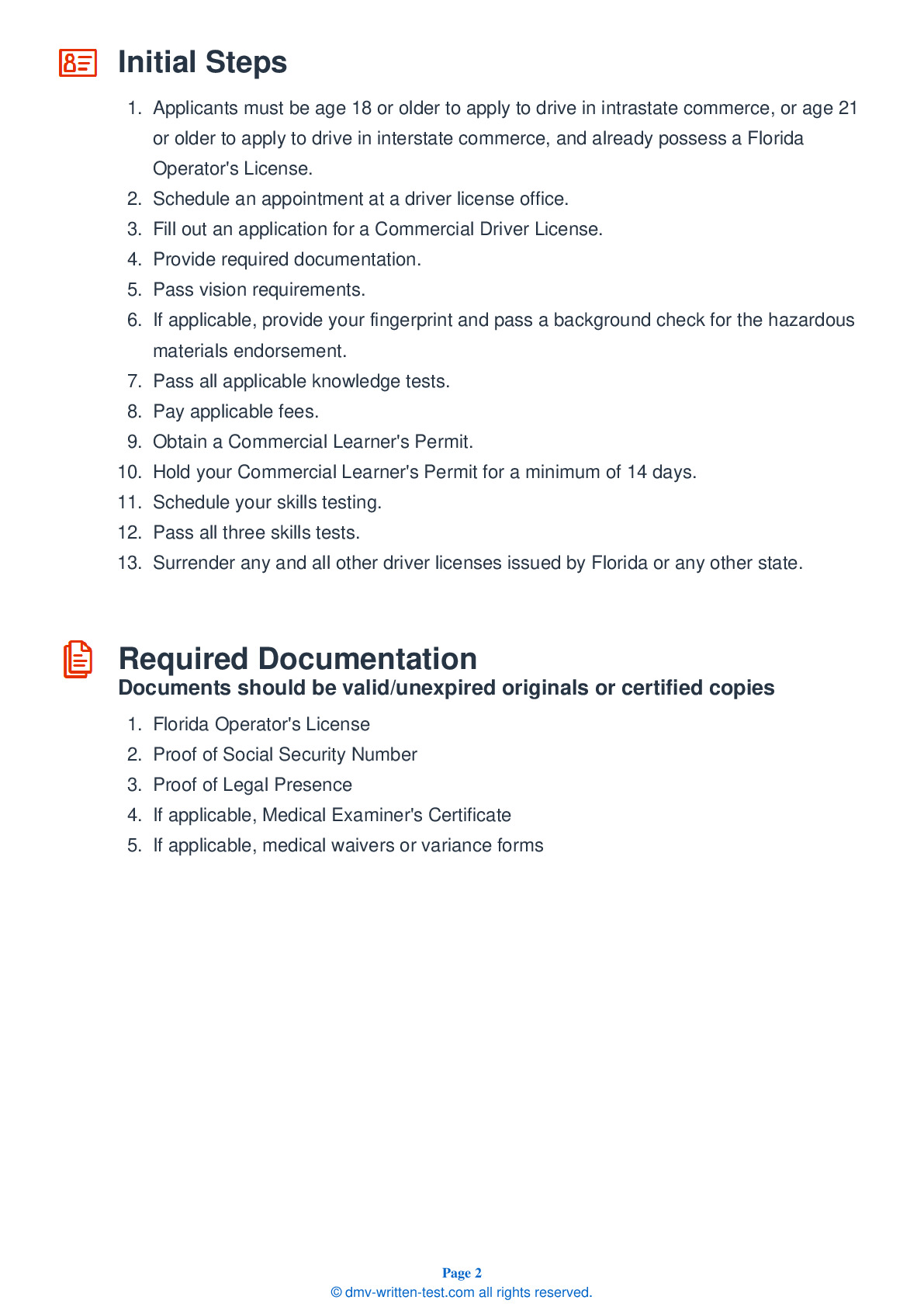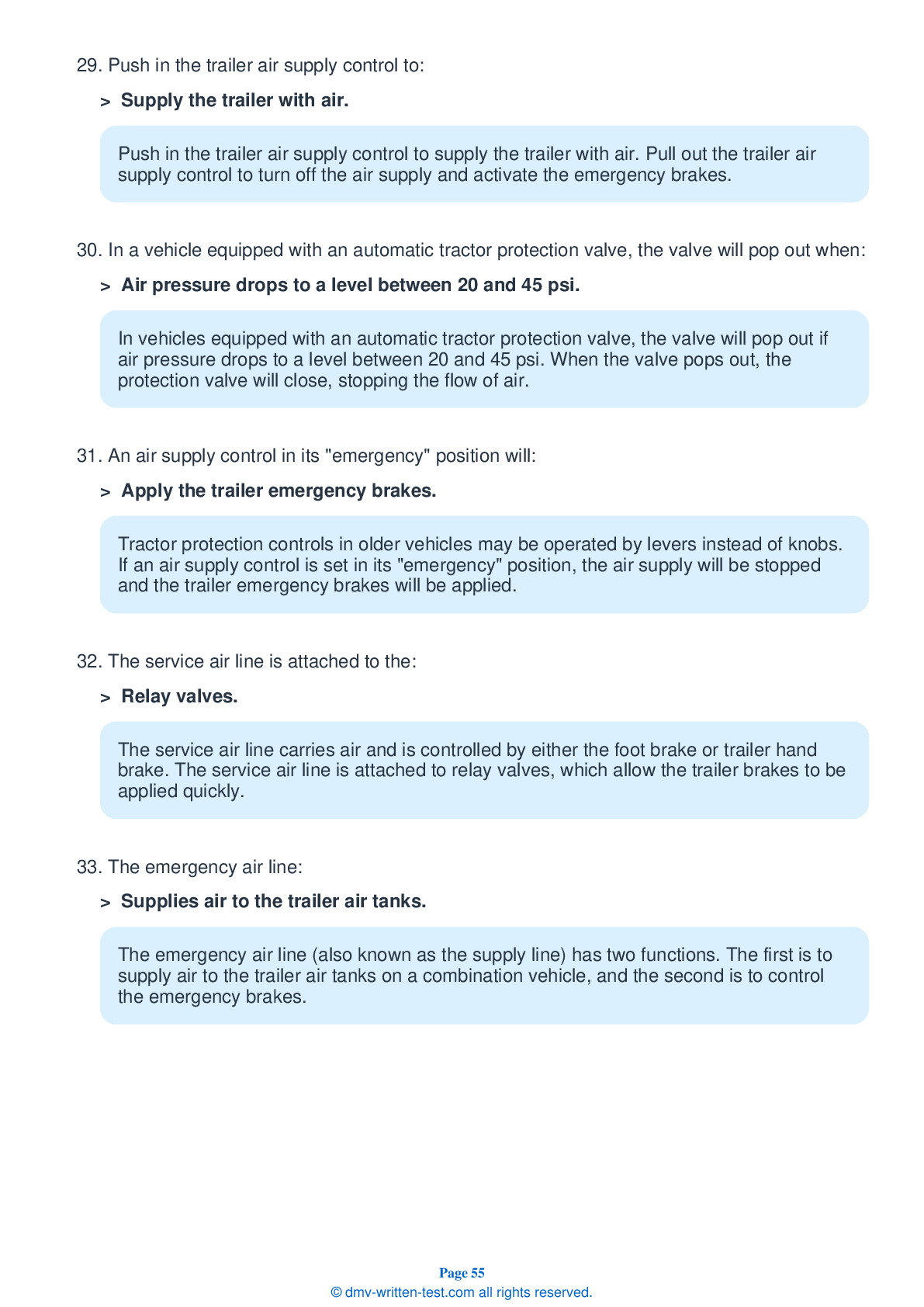Knowledge Test Class B
This license is required for driving a single vehicle with a GVWR of more than 26,001 pounds, and a trailer not to exceed 10,000 pounds gross vehicle weight rating, or a vehicle designed to transport 24 or more people (including the driver). To receive this license, applicants must pass a 50-question test. To pass, applicants must answer 40 questions correctly. Test questions come from the Florida CDL Handbook. Questions come from chapters covering: Introduction, Driving Safely, Transporting Cargo Safely, Air Brakes (if applicable), Combination Vehicles, Pre-Trip Vehicle Inspection Test, Basic Vehicle Control Skills Test and On-Road Driving. Endorsements that may be used with a Class B CDL are: Hazardous materials, Tank, Passenger, HazMat and Tank, Air Brakes and School bus.
43. When encountering a railroad crossing during the driving test, you should:
During the on-road driving test, you must not stop, change gears, pass another vehicle, or change lanes while any part of your vehicle is in a railroad crossing.
44. During a basic vehicle control skills test, you may be asked to:
Maneuvers that may be included in the basic vehicle control skills test include straight line backing, offset back/right parking, offset back/left parking, driver side parallel parking, conventional parallel parking, and alley docking.
45. Why should the steps of a pre-trip inspection be done in the same order each time?
Doing an inspection the same way every time will help you learn the necessary steps. You will be less likely to forget a step if you get into a routine.
46. Fuel records supporting IFTA quarterly fuel use tax returns must be kept by carriers for:
In general, if you operate a commercial vehicle in interstate commerce, it must be registered under the International Registration Plan (IRP) and International Fuel Tax Agreement (IFTA). These programs collect and distribute vehicle registration fees and fuel taxes based on what jurisdictions you drive in and for how long. Mileage and fuel records supporting IFTA quarterly fuel tax returns must be retained by carriers for four years.
47. When driving through a curve during the skills test, you should:
When approaching a curve during the on-road driving skills test, you must reduce your speed sufficiently before entering the curve so that you do not need to further brake or shift in the curve. Keep the vehicle in its lane and continue to check for traffic in all directions.
48. When making tight maneuvers, it is important for a driver to:
While regular mirror checks should always be part of your driving routine, you should make a particular point of checking the mirrors when changing lanes, turning, merging, or making tight maneuvers.
49. When backing, you should:
Backing a large CMV is always dangerous because you will not be able to see everything behind you. If you must back up, use a helper, if possible.
50. While driving, if you notice anything affecting safety or mechanics, you should:
At the end of each day of driving, you may be required to make a written report on the vehicle or vehicles driven. Be sure to make note of any issues that could affect the safety of the vehicle or that could lead to a mechanical breakdown.
Frequently Asked Questions
Here are the steps to obtain a Class B CDL in Florida:
1. Obtain a Florida Commercial Learner's Permit (CLP) by passing the written test for the Class B CDL. You must be at least 18 years old to obtain a CLP and 21 years old to obtain a full Class B CDL.
2. Practice driving with your CLP for at least 14 days before taking the driving skills test.
3. Schedule and pass the driving skills test, which includes pre-trip inspection, basic vehicle control, and on-road driving.
4. Submit the necessary documentation and fees to the Department of Highway Safety and Motor Vehicles (DHSMV) to obtain your Class B CDL.
5. Maintain your Class B CDL by complying with all state and federal regulations, including regular medical examinations and recordkeeping requirements.
It is important to note that obtaining a Class B CDL may also require additional endorsements, such as hazardous materials or passenger transportation endorsements, depending on the type of vehicle you will be operating.
- Straight trucks (e.g., dump trucks, delivery trucks, box trucks)
- Large buses (e.g., school buses, city buses)
- Segmented buses
- Tourist and charter buses
- Tractor-trailer combinations (also known as semi-trucks or 18-wheelers) with a trailer less than 10,000 pounds
It is important to note that additional endorsements may be required to operate certain types of vehicles or cargo. For example, a hazardous materials endorsement is required to transport hazardous materials, and a passenger endorsement is required to transport passengers.
1. Be at least 18 years old to obtain a Commercial Learner's Permit (CLP) and 21 years old for a full Class B CDL.
2. Hold a valid Florida driver's license.
3. Provide proof of identity and residency, such as a birth certificate, passport, or utility bill.
4. Pass a medical examination and obtain a Medical Examiner's Certificate to prove you are physically able to operate a commercial vehicle.
5. Pass a written test for the Class B CDL knowledge test.
6. Obtain a CLP by passing the written test.
7. Hold your CLP for at least 14 days before taking the driving skills test.
8. Pass the driving skills test, which includes pre-trip inspection, basic vehicle control, and on-road driving.
9. Pay the necessary fees to obtain your Class B CDL.
In addition to these requirements, you may need to obtain additional endorsements for certain types of vehicles or cargo, such as hazardous materials or passenger transportation endorsements.
It is important to note that commercial drivers are subject to additional regulations and requirements, including recordkeeping and periodic medical examinations, to ensure safety on the roads.
Drivers who are between the ages of 18 and 20 may only operate commercial vehicles within the state of Florida, and cannot transport hazardous materials or passengers. They are also not eligible for an interstate commerce waiver.
It is important to note that even if you meet the minimum age requirement, you must also meet other requirements, such as passing a medical examination and obtaining a Medical Examiner's Certificate, passing written and driving skills tests, and obtaining any necessary endorsements.
The following endorsements are available for Class B CDL holders in Florida:
1. Passenger endorsement - required for drivers who will be transporting more than 15 passengers, such as in a bus.
2. School bus endorsement - required for drivers who will be operating a school bus.
3. Tanker endorsement - required for drivers who will be hauling liquids or gases in bulk containers.
4. Hazardous materials (HazMat) endorsement - required for drivers who will be transporting hazardous materials, as defined by the federal government.
To obtain any of these endorsements, you must pass additional knowledge tests and meet other requirements, such as background checks and fingerprinting. It is important to note that certain endorsements may also require additional training and certification.
It is recommended to check with your employer or the specific job requirements to determine if any endorsements are needed for your Class B CDL license.
1. Pre-trip inspection: You will be asked to do a pre-trip inspection of your vehicle to ensure that it is safe to operate. This includes checking the brakes, tires, lights, horn, and other important parts of the vehicle.
2. Basic vehicle control: You will be required to demonstrate your ability to control the vehicle in various situations, such as backing up, turning, and parking.
3. Road test: You will be required to drive the vehicle on public roads while demonstrating your ability to safely operate the vehicle and follow traffic laws.
During the skills test, you will be evaluated on your ability to perform each task safely and correctly. The examiner will use a scoring system to evaluate your performance and determine if you have passed or failed the test.
It is important to note that you must hold a valid Commercial Learner's Permit (CLP) for at least 14 days before you can take the skills test. You must also provide a properly equipped and registered vehicle for the test.
1. No passengers: If you have a Class B CDL without a passenger endorsement, you cannot transport more than one passenger who is riding with you to help in the operation of the commercial vehicle.
2. No HazMat: If you have a Class B CDL without a HazMat endorsement, you cannot transport hazardous materials.
3. No combination vehicles: A Class B CDL holder is not allowed to operate a combination of vehicles with a total weight of 26,001 pounds or more.
4. No air brakes: If you take your skills test in a vehicle without air brakes, your CDL will be restricted to vehicles without air brakes.
5. No manual transmission: If you take your skills test in an automatic transmission vehicle, your CDL will be restricted to automatic transmission vehicles only.
It is important to note that these restrictions and limitations may vary depending on the specific endorsements and restrictions on your CDL license. It is recommended to check with the Florida Department of Highway Safety and Motor Vehicles (DHSMV) or your employer for more information on any applicable restrictions or limitations.
To take the written test in a language other than English, you must first obtain a Florida CDL handbook in that language. You can download the handbook from the DHSMV website or obtain a hard copy from a local DHSMV office.
Once you have studied the handbook, you can schedule an appointment to take the written test at a DHSMV office that offers testing in your preferred language. You will need to bring proper identification and payment for any testing fees.
It is important to note that the skills test must be taken in English, as it involves communication with the examiner and following traffic signs and signals in English.
To request accommodations, you must complete an ADA Accommodation Request form and submit it to the DHSMV. You can obtain the form from a local DHSMV office or download it from the DHSMV website.
The form requires documentation of your disability and the specific accommodations you are requesting. Examples of accommodations that may be provided include extended testing time, a separate testing room, or a sign language interpreter.
Once your request has been received and reviewed by the DHSMV, they will contact you to schedule your test with the requested accommodations. It is important to submit your request well in advance of your desired testing date to allow for processing time.
If you have any questions or concerns about requesting accommodations for the Class B CDL written test, you can contact the DHSMV directly for assistance.
When you retake the test, you will need to pay the testing fee again. The fee for the Class B CDL written test is $10.
It is important to note that there is a limit to the number of times you can take the written test in a 30-day period. If you fail the test three times within a 30-day period, you will be required to wait at least 30 days before taking the test again.
To increase your chances of passing the test on your next attempt, it is recommended that you review the Florida CDL Handbook thoroughly and take practice tests before retaking the exam. You can find practice tests online or through commercial CDL training programs.
If you have any questions or concerns about retaking the Class B CDL written test, you can contact the Florida Department of Highway Safety and Motor Vehicles (DHSMV) for assistance.




